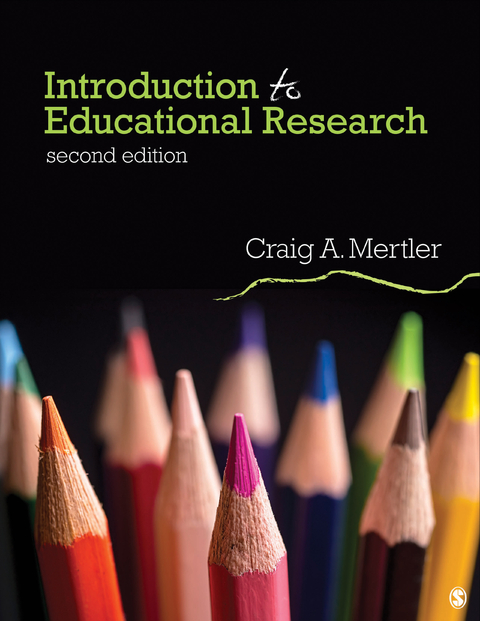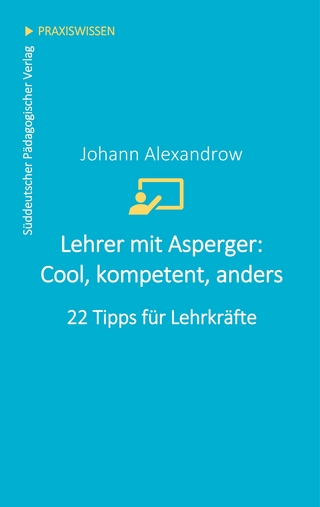
Introduction to Educational Research
SAGE Publications Inc (Verlag)
978-1-5063-6612-8 (ISBN)
- Titel ist leider vergriffen;
keine Neuauflage - Artikel merken
NEW TO THIS EDITION:
- Additional online resources for locating related research literature—including EBSCO, JSTOR, PsycINFO, SAGE Journals, and Sociological Abstracts—help facilitate student research.
- Greater detail regarding APA Style, such as new sections on “bias-free writing” and “plagiarism and self-plagiarism,” better prepare students to correctly write-up their results.
- New examples of qualitative analysis (including screenshots) using Dedoose demonstrates tech-supported analysis of qualitative data.
- New discussions address the role and value of replication studies and the Family Educational Rights and Privacy Act (FERPA).
- A new section on research proposals for action research and mixed-methods studies provides additional clarification for designing proposals for mixed-methods or action research studies.
KEY FEATURES:
- Student Learning Objectives (SLOs) provide a preview for each chapter, list the 4 to 8 major targeted learning objectives for that chapter, and are ideal for review.
- Chapter-ending Developmental Activities provide opportunities for students to apply concepts and skills and can be used as course assignments or for in-class activities and discussions.
- Thorough Chapter Summaries listed in bullet-point format provide focused reviews of chapter content.
- A complete research report in the appendix offers an opportunity to engage in a critique of a published article and to see the format and writing style appropriate for academic journals.
- A glossary of more than 350 terms—highlighted in boldface when first introduced in the text—offers access to one of the most comprehensive glossaries presented in any educational research textbook.
Dr. Craig A. Mertler is currently an Associate Professor at Arizona State University. He began his career as a high school biology teacher. He has been an educator for 32 years--22 of those in higher education at Bowling Green State University, the University of West Georgia, Lynn University, and Arizona State University, and 9 as an administrator (department chair, doctoral program director, and education dean). Over his career, he has taught courses focused on the application of action research to promote educator empowerment, school improvement, and job-embedded professional development, as well as classroom assessment, research methods, and statistical analyses. He has served as the research methodology expert on more than 100 doctoral dissertations and master's theses. He is the author of 23 books, 8 invited book chapters, and 20 refereed journal articles. He has also presented more than 35 research papers at professional meetings around the country, as well as internationally. Dr. Mertler can be reached at craig.mertler@gmail.com for consulting, professional development, and speaking engagements. Additionally, you can visit his website at craigmertler.com and connect with him on Twitter @craigmertler.
Preface
Acknowledgments
About the Author
PART I. INITIAL RESEARCH CONSIDERATIONS
Chapter 1. What Is Educational Research?
Finding Answers to Questions
The Scientific Method
Educational Research—What It Is and What It Is Not
Educational Research as a Process
Knowing Your Specific Discipline
Educators as Researchers
Chapter 2. Overview of the Educational Research Process
Identifying and Limiting a Research Topic or Problem
Formally Stating and Refining Research Question(s)
Reviewing Existing Literature Related to the Problem
Writing a Literature Review
Developing a Research Plan
Implementing the Research Plan and Collecting Data
Analyzing the Data
Stating Findings, Conclusions, and Recommendations in a Written Research Report
The Educational Research Process—A Brief Example
Chapter 3. Identifying a Research Problem
Identifying a Research Topic or Problem
Necessary Terminology Related to Research
Research Questions and Hypotheses
Chapter 4. Ethics in Educational Research
Ethical Considerations in the Conduct of Research
Ethics in Qualitative Versus Quantitative Studies
Institutional Review Boards
Formal Preparation for Research with Human Participants
Chapter 5. Reviewing Related Research Literature
What Is a Literature Review?
Sources for Literature Related to Your Research Topic
Searching the ERIC Online Database
Searching the Google Scholar Online Database
Writing Your Literature Review
Not Just for Conducting Research—Valuable Sources for Professional Development
PART II. DESIGNING A RESEARCH STUDY
Chapter 6. Qualitative Research Methods
Characteristics of Qualitative Research
The Qualitative Research Process
Approaches to Conducting Qualitative Research
More About Ethnographic Research
More About Narrative Research
Chapter 7. Quantitative Research Methods
Characteristics of Quantitative Research
The Quantitative Research Process
Nonexperimental Research Designs
Experimental Research Designs
Threats to Validity in Quantitative Designs
Chapter 8. Mixed-Methods Research
Characteristics of Mixed-Methods Research
The Mixed-Methods Research Process
Approaches to Conducting Mixed-Methods Research
Validity in Mixed-Methods Research
Strengths and Limitations of Mixed-Methods Research
Chapter 9. Action Research
Characteristics of Action Research
The Action Research Process
Action Planning and Reflection
Validity in Action Research
Strengths and Limitations of Action Research
Chapter 10. Writing a Research Proposal
Purpose of a Research Proposal
General Aspects of a Research Proposal
Components of a Quantitative Research Proposal
Components of a Qualitative Research Proposal
Proposals for Action Research and Mixed-Methods Studies
PART III. COLLECTING AND ANALYZING DATA
Chapter 11. Qualitative Data Collection and Analysis
Sampling Techniques in Qualitative Research
Qualitative Data Collection Techniques
Characteristics of Qualitative Data: Accuracy, Credibility, and Dependability
Qualitative Data Analysis Techniques
Chapter 12. Quantitative Data Collection
Sampling Techniques in Quantitative Research
Scales of Measurement
Quantitative Data Collection Techniques
Characteristics of Quantitative Data: Validity and Reliability
Chapter 13. Quantitative Data Analysis
Quantitative Data Analysis Techniques
PART IV. THE RESEARCH REPORT
Chapter 14. Writing a Final Research Report
Importance of the Audience
General Guidelines for Writing a Research Report
Practical Guidelines for Writing
An Example of a Research Report
Appendix: Teachers’ Perceptions of the Influence of No Child Left Behind on Classroom Practices
Glossary
References
Index
| Erscheinungsdatum | 27.03.2018 |
|---|---|
| Verlagsort | Thousand Oaks |
| Sprache | englisch |
| Maße | 216 x 277 mm |
| Gewicht | 726 g |
| Themenwelt | Sozialwissenschaften ► Pädagogik ► Bildungstheorie |
| Sozialwissenschaften ► Soziologie ► Empirische Sozialforschung | |
| ISBN-10 | 1-5063-6612-0 / 1506366120 |
| ISBN-13 | 978-1-5063-6612-8 / 9781506366128 |
| Zustand | Neuware |
| Haben Sie eine Frage zum Produkt? |
aus dem Bereich


